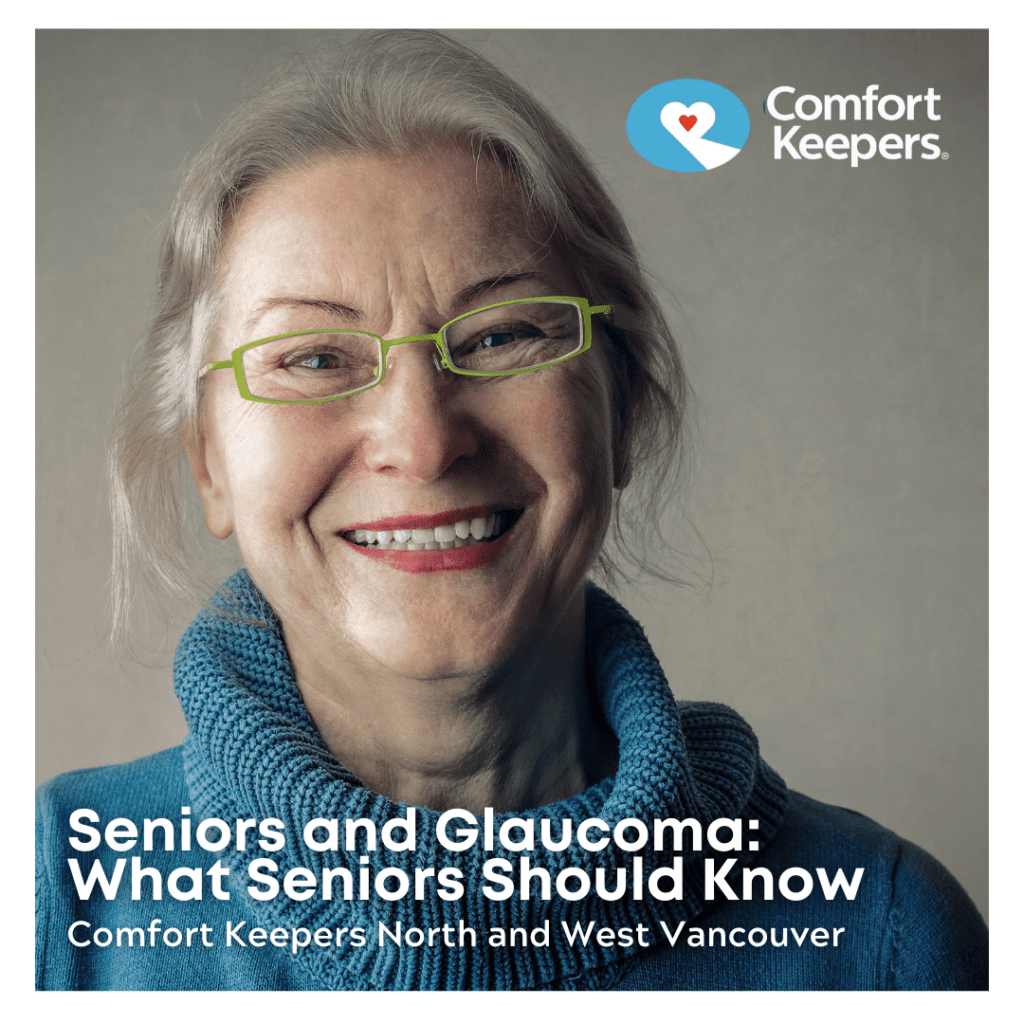Seniors and Glaucoma: What Seniors Should Know
North Vancouver Senior Health | December 13, 2023

What Every Senior in North and West Vancouver, BC Needs to Know About Glaucoma and Senior Eye Health
Seniors and Glaucoma | Glaucoma is a set of conditions that can harm the optic nerve and lead to loss of eyesight. It ranks as the second most common cause of blindness. When the fluid pressure inside the eye gradually increases, it causes glaucoma. Surprisingly, up to 40 percent of one’s vision can be lost without any detectable symptoms. Thankfully, timely intervention can safeguard your eyes against significant vision impairment.
Why Do Some Seniors Develop Glaucoma?
Situated in the front of the eye lies the anterior chamber. This area is constantly supplied with a clear fluid that nourishes surrounding tissues. The fluid exits the chamber through what is known as the open angle, located at the meeting point of the cornea and iris. Upon reaching this angle, it passes through a porous mesh pattern that functions as a drain for the eye. However, there may be instances when this drainage process occurs too slowly, resulting in an accumulation of fluid and an increase in internal pressure. Such elevated pressure levels can potentially harm the optic nerve and cause vision loss. Hence, it is crucial to regulate and maintain proper eye pressure.
Having high eye pressure does not necessarily mean that you will develop glaucoma. Each individual may have a different tolerance for elevated eye pressure. To determine your normal level of eye pressure, it is recommended to undergo a thorough dilated eye exam by a professional.
Most Common Types of Glaucoma in Seniors
Open-Angle Glaucoma:
The most prevalent form of glaucoma, open-angle glaucoma, impacts almost 3 million individuals in the United States. This type typically causes a gradual decrease in peripheral vision without any discomfort. It develops when the drainage canals of the eye gradually become obstructed. The resulting vision impairment is comparable to viewing through a rolled-up paper towel. Early symptoms are usually absent, and sight loss may go unnoticed for an extended period. Fortunately, this kind of glaucoma typically responds well to medication, particularly if detected and addressed promptly.
Low-Tension or Normal-Tension Glaucoma:
Low-Tension or Normal-Tension Glaucoma, also known as NTG, is a condition in which the optic nerve is damaged and the side vision becomes narrower. This can happen even if a person’s eye pressure is normal. While some may experience relief by lowering their eye pressure by at least 30 percent using medication, others may see their condition worsen despite low pressures. A thorough medical history is crucial in identifying any potential risk factors, such as low blood pressure. If no risk factors are found, the treatment options for this form of glaucoma are the same as those for open-angle glaucoma.
Angle-Closure Glaucoma:
In this particular type of glaucoma, the flow of fluid from the front of the eye is unable to reach the angle and exit, as a part of the iris obstructs it. As a consequence, there is a sudden elevation in eye pressure. Indicators include intense discomfort and queasiness, discoloration of the eye, and distorted eyesight. If you are experiencing any of these signs, you must seek immediate medical attention. Without prompt intervention, vision loss can occur within a matter of one or two days. Typically, urgent laser surgery and medication can alleviate the obstruction and preserve vision.
There are also rare types of glaucoma that can affect seniors. One such type is pigmentary glaucoma, which results from iris pigment flaking off and obstructing the meshwork, leading to a gradual buildup of fluid that poses a significant risk to vision over time. In addition, trauma-related glaucoma can be triggered by a severe eye injury caused by a blow, chemical burn, or penetration.
What Seniors Can Do About Glaucoma
Currently, there is no known cure for glaucoma. Nevertheless, there are options such as medication or surgery that can slow down or impede any additional loss of vision. The most suitable course of action varies according to the specific type of glaucoma a person has.
As time passes, certain medications may become ineffective or clash with other prescribed drugs. A physician must oversee the treatment and monitoring of glaucoma and its related medications. If you are undergoing treatment for glaucoma, it is important to remember to take your prescribed medicine daily.
What the Research Says About Glaucoma
Research has indicated that the optimal method for managing the disease is through early detection and treatment before significant impairment occurs. It is important to schedule routine examinations with an eye care specialist, which include dilation of the pupils. For individuals over 40, an exam every two to four years is advised, with annual exams suggested after reaching 55 years of age. Those above 50 years old with a family history of glaucoma are recommended to have yearly comprehensive exams.
The Best Senior Home Care in North and West Vancouver is Comfort Keepers®
Our senior home care agency offers in-home care focusing on aging in place. Our services include dementia care, end-of-life care, post-surgery care, and palliative care. Comfort Keepers can assist seniors with living transition services, personal care, companionship care, and more!
Quality and Accredited Elderly Care: Happier, Healthier, and at Home with 24/7 Senior Care Opportunities!
Do you need a home care solution for yourself or a loved one? Have you been thinking about retirement homes and their alternatives as a solution? Comfort Keepers® enables seniors to maintain happy, healthy lives in the comfort of their own homes. In-home care services are available in North Vancouver, West Vancouver, and the surrounding areas.
Comfort Keepers® is a Senior Care Agency That Can Make a Difference with Interactive Caregiving™
Our in-home caregivers ensure our senior clients have the best quality of life. The Interactive Caregiving™ program ensures that a senior’s safety, nutrition, mental well-being, and everyday needs are met. This program brings joy and good health to each client’s home.
Comfort Keepers® North Vancouver and West Vancouver Can Help with In-Home Elderly Care Services!
If you are concerned about the health and well-being of a loved one we can help! Comfort Keepers offers 24-hour care and delivers top-quality and compassionate care for seniors. We are dedicated to safety technology solutions that foster independence and enhance well-being.
Locally Owned and Operated Home Health Care Agency
Our care centers around companionship for seniors. Empathetic care originates from the soul and allows us to meet our client’s requirements. The seasoned in-home caregivers employed by Comfort Keepers are carefully chosen based on their empathetic qualities.
Contact the Comfort Keepers® North Vancouver and West Vancouver office at (604) 998-8806 to learn more about our unique in-home care solutions for seniors.
Comfort Keepers is an Accredited Senior Care Agency in North and West Vancouver, BC
Accreditation is a rigorous process that involves industry experts evaluating an organization’s processes, policies, and procedures. Comfort Keepers® North and West Vancouver has been awarded Exemplary Standing by Accreditation Canada. This achievement recognizes that Comfort Keepers® meets or exceeds the stringent quality standards for Home Care companies established by Accreditation Canada.
References:
AgingCare.com. “Glaucoma Can Steal 40% of Vision Before the Person Notices” by Marlo Sollitto. Web.2016.
A Place for Mom. “Glaucoma In Seniors: Symptoms & Care” by Jeannette Franks, PhD. Web. 2013.
Glaucoma Research Foundation.“Glaucoma Facts and Stats.” Web. 2016.
Individualized Home Care Options
Long-Term Home Care, 24 Hour Home Care & Short Term Care Options Customized for You





